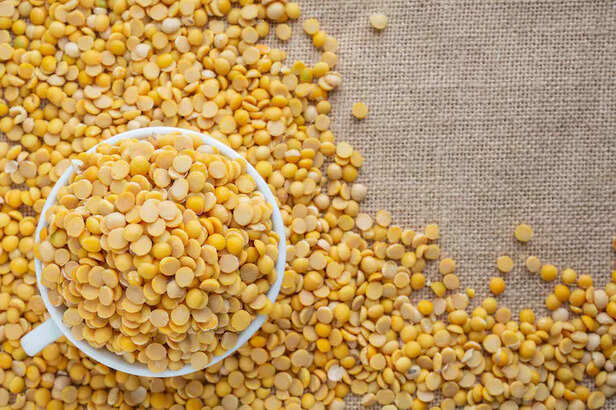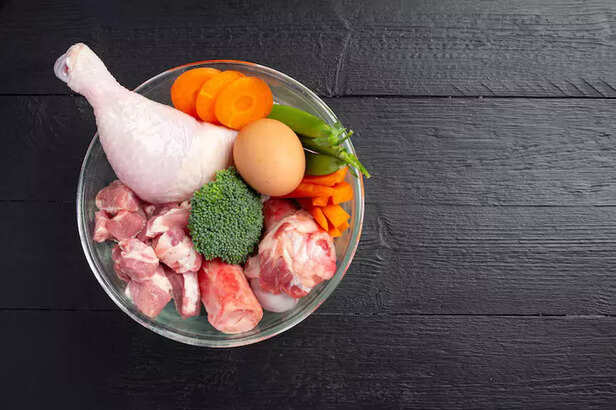How Much Protein Do You Really Need?
Amritansh Nayak | May 02, 2025, 12:25 IST
How to determine your daily protein requirements depending on your weight, goals, and lifestyle is explained in this article. It dispels common protein myths, discusses how sedentary people, athletes, and older persons differ in their needs, and provides helpful dietary advice to help you reach your intake. Discover more intelligent ways to fuel your body.
With good reason, protein is frequently referred to be the "building block" of life. It is essential to your general health, from hormone production to muscle regeneration. However, how much do you really require? Your actual protein requirements vary depending on your body, age, amount of exercise, and objectives, even if the Recommended Dietary Allowance provides a general guideline. Whether you're an athlete, inactive person, or just trying to improve your health, this guide will help you properly customize how much protein you eat.

How to Determine Your
The Recommended Dietary Allowance (RDA), which is 0.8 grammes of protein per kilogram of body weight per day, is the first step in determining how much protein you need. This indicates that, in order to achieve fundamental physiological needs like tissue repair and enzyme production, a sedentary adult weighing 70 kg (154 lbs.) would require roughly 56 grammes of protein each day. This baseline isn't universal, though. Body weight, sex, and age all affect how much protein is needed. For instance, men often need more protein than women because of their larger average muscle mass, and older persons frequently need more to help avoid muscle loss. Goals for health and activity level are also crucial.
Your protein requirements may increase to 1.2–2.0 grammes per kilogram of body weight if you engage in physical activity, particularly strength training or endurance sports. Similar to this, increasing your protein intake promotes muscle repair and aids in satiety if your goal is to gain muscle or lose weight. In summary, your optimum protein intake varies depending on your body type and activity, even if the RDA is a starting point. Tailoring your protein intake guarantees improved energy, recuperation, and general well-being.

Everybody has different needs for protein, which vary greatly based on lifestyle and health objectives. The recommended RDA of 0.8 grammes per kilogram of body weight is typically adequate for sedentary adults to sustain essential bodily functioning. This low intake, meanwhile, might not promote the best possible muscle maintenance or recuperation following infrequent exercise. Athletes and active people, on the other hand, need extra protein for muscle growth and repair. Strength trainers and bodybuilders may benefit from 1.6–2.2 g/kg, particularly during periods of hard training, while endurance athletes such as runners or cyclists often require 1.2–1.4 g/kg.
Increased protein consumption can also help those on diets aimed at losing weight. During calorie restriction, eating 1.2–1.6 g/kg can improve metabolism, enhance sensations of fullness, and preserve lean muscle mass. More protein is essential for elderly persons. Muscle loss (sarcopenia) is a result of a deterioration in our capacity to synthesize muscle protein as we age. Strength, mobility, and general health are maintained when 1.0–1.2 g/kg or more is consumed. In the end, adjusting your protein consumption to your lifestyle guarantees that you fulfil not just the bare minimal requirements but also the ideal ones for the longevity and functionality of your body.

Myths regarding protein frequently cause people to be confused about the right kind and quantity. "More is always better" is a popular concept. Although protein is necessary, eating too much of it—especially much more than your body can use—does not result in further muscle growth. Instead, most people do not profit from extra protein, which is either expelled or stored as fat. "You can't get enough protein on a plant-based diet" is another fallacy. In actuality, it is completely feasible to satisfy protein requirements without using animal products by consuming a range of legumes, grains, soy products, nuts, and seeds.
Eating a variety of plant proteins throughout the day can easily supply all the needed amino acids. Lastly, people who already have renal illness are primarily concerned about the assertion that "too much protein harms your kidneys." High-protein diets are generally safe for healthy individuals. Moderation is still essential, though; prolonged, excessive consumption without medical supervision is not advised.
Including a range of nutrient-rich meals makes it easier than you might think to meet your daily protein needs. Complete proteins, such as those found in eggs, chicken, fish, yoghurt, and lean cattle, are made up of all the essential amino acids. Lentils, tofu, chickpeas, quinoa, almonds, and soy milk are examples of plant-based foods that make a substantial contribution, particularly when combined to create a balanced amino acid profile.
An example day with a moderate protein target (around 70 grammes)
There is no one-size-fits-all amount of protein that is required. Although the RDA offers a starting point, your age, goals, and lifestyle all affect how much protein you actually require. Getting enough high-quality protein and distributing it properly is essential for preserving your health as you age, gaining muscle, and losing weight. Whether you consume animal products or stick to a plant-based diet, you may still achieve your goals organically with careful planning.
Explore the latest trends and tips in Health & Fitness, Travel, Life Hacks, Fashion & Beauty, and Relationships at Times Life!

add protein in your diet
How to Determine Your Daily Protein Needs
Your protein requirements may increase to 1.2–2.0 grammes per kilogram of body weight if you engage in physical activity, particularly strength training or endurance sports. Similar to this, increasing your protein intake promotes muscle repair and aids in satiety if your goal is to gain muscle or lose weight. In summary, your optimum protein intake varies depending on your body type and activity, even if the RDA is a starting point. Tailoring your protein intake guarantees improved energy, recuperation, and general well-being.

vegetarian protein source
Protein Needs for Various Ways of Life
Increased protein consumption can also help those on diets aimed at losing weight. During calorie restriction, eating 1.2–1.6 g/kg can improve metabolism, enhance sensations of fullness, and preserve lean muscle mass. More protein is essential for elderly persons. Muscle loss (sarcopenia) is a result of a deterioration in our capacity to synthesize muscle protein as we age. Strength, mobility, and general health are maintained when 1.0–1.2 g/kg or more is consumed. In the end, adjusting your protein consumption to your lifestyle guarantees that you fulfil not just the bare minimal requirements but also the ideal ones for the longevity and functionality of your body.

myths about protein
Typical Myths Regarding Protein Consumption
Eating a variety of plant proteins throughout the day can easily supply all the needed amino acids. Lastly, people who already have renal illness are primarily concerned about the assertion that "too much protein harms your kidneys." High-protein diets are generally safe for healthy individuals. Moderation is still essential, though; prolonged, excessive consumption without medical supervision is not advised.
How to Consume Food to Achieve Your Daily Protein Needs
An example day with a moderate protein target (around 70 grammes)
- Almonds and Greek yoghurt (20g) for breakfast
- Lunch would be 25g of grilled chicken salad with chickpeas.
- Snack: 15g of protein smoothie made with peanut butter and soy milk
- Supper will be stir-fried tofu with vegetables and brown rice (10g).
There is no one-size-fits-all amount of protein that is required. Although the RDA offers a starting point, your age, goals, and lifestyle all affect how much protein you actually require. Getting enough high-quality protein and distributing it properly is essential for preserving your health as you age, gaining muscle, and losing weight. Whether you consume animal products or stick to a plant-based diet, you may still achieve your goals organically with careful planning.
Explore the latest trends and tips in Health & Fitness, Travel, Life Hacks, Fashion & Beauty, and Relationships at Times Life!
